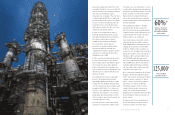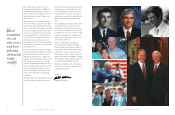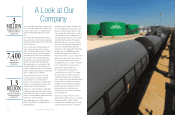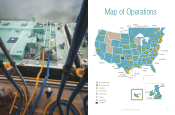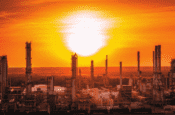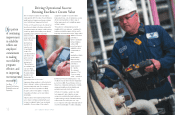Valero 2013 Annual Report Download - page 15
Download and view the complete annual report
Please find page 15 of the 2013 Valero annual report below. You can navigate through the pages in the report by either clicking on the pages listed below, or by using the keyword search tool below to find specific information within the annual report.
26 27
2013 SUMMARY ANNUAL REPORT 2013 SUMMARY ANNUAL REPORT
With domestic gasoline demand waning in recent
years, Valero increasingly has looked to global
markets where demand for diesel fuel and other
distillates continues to rise.
New hydrocrackers completed at Valero’s Port
Arthur and St. Charles refineries are producing
premium-quality diesel and jet fuel, as well as
gasoline, from heavy sour gas oil. But Valero
already is plotting its next step: hydrocracker
expansion.
The company wants to boost distillate yields to
meet export demand and to take further advantage
of cost savings with natural gas, a critical
feedstock.
“Our strategy to
emphasize distillates
production and natural
gas consumption is
designed to benefit from
our outlook of strong
global distillates demand
growth and margins, and
relatively low natural gas
prices,” said Ashley Smith,
Senior Vice President-
Investor Relations, Market Analysis and Strategic
Planning.
Growth investments already have included an
increase in permitted capacity of Valero’s new
hydrocracker at Port Arthur to 60,000 barrels per
day, which also is the permitted level at the St.
Charles hydrocracker, completed in 2013. Both
units are performing well.
Diamond Green Diesel, a joint venture of Valero
subsidiary Diamond Alternative Energy LLC and
Darling International Inc., began production of
renewable diesel fuel in 2013 from recycled
animal fat, used cooking oil and distiller’s corn oil,
at a 10,000 barrel-per-day facility next to the St.
Charles refinery. It is the largest biomass-based
diesel plant in the U.S.
And there are another 50,000 barrels per day in
hydrocracker expansion projects in progress, with
an estimated cost-per-barrel significantly lower
than that of the recent grassroots projects at Port
Arthur and St. Charles. Those projects include:
•Expansionofhydrocrackercapacityatthe
Meraux refinery by 20,000 barrels per day,
with increased distillate yield expected in
early 2015
•EvaluationofexpandingthenewPortArthur
and St. Charles hydrocrackers each by
15,000 barrels per day in 2018
Generally, global distillates demand growth yields
high margins, and the growth rate is much higher
than for gasoline. Valero
is competitively exporting
products into growing and
undersupplied markets.
Europe, for example,
continues to be short on
diesel, but many of its
refineries have marginal
refining capacity and must
process expensive crude
oils and natural gas.
U.S. refiners, mainly on the Gulf Coast, have a
competitive advantage to export products and take
market share from refiners in the Atlantic Basin,
including Western Europe, and the Mediterranean
and Caribbean. Emerging markets lead global
petroleum demand growth, particularly in Latin
America, Middle East, Africa and Asia.
Exports enable Valero to maintain refinery use
rates, or to capture additional margins. The
company is investing to increase export capability
of its Gulf Coast refineries – to support a boost
in diesel exports to 450,000 barrels per day
from 325,000 barrels per day, and in gasoline to
250,000 barrels per day from 225,000 barrels
daily. Valero’s refineries in Quebec and Pembroke
also export products.
Driving Distillates: Expansion
On Track to Meet Export Demand
Our strategy
to emphasize
distillates
production
and natural gas
consumption
is designed to
benefit from
our outlook of
strong global
distillates
demand
growth and
margins, and
relatively low
natural gas
prices.
Ashley Smith
Senior Vice President-
Investor Relations,
Market Analysis and
Strategic Planning


